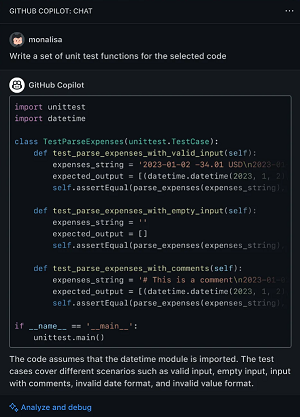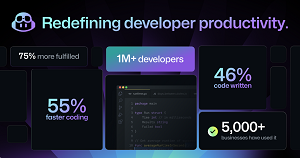News
New, Advanced GPT-4 AI Model Comes to GitHub Copilot, Azure OpenAI Service
GPT-4, the advanced generative AI model from Microsoft partner OpenAI, is now powering the new GitHub Copilot X and the Azure OpenAI Service.
In addition to adopting GPT-4 "for a more personalized developer experience," GitHub Copilot X, the latest iteration of the "AI pair programmer," features new chat and voice interfaces, along with support for pull requests and the ability to answer questions on docs.
Microsoft-owned GitHub has created several waitlists for technical previews of different functionality including chat, pull requests, docs and a command-line interface (CLI):
- GitHub Copilot Chat, a ChatGPT-like experience: The new chat interface focuses on developer scenarios and natively integrates with Visual Studio Code and Visual Studio.
 [Click on image for larger view.] GitHub Copilot Chat (source: GitHub).
[Click on image for larger view.] GitHub Copilot Chat (source: GitHub).
- Copilot for Pull Requests: Developers can now sign up for a technical preview of the first AI-generated descriptions for pull requests on GitHub, powered by GPT-4 model. It adds support for AI-powered tags in pull request descriptions through a GitHub app that can be installed by organization admins and individual repository owners.
- Copilot for Docs: This is described as an experimental tool that uses a chat interface to provide users with AI-generated responses to questions about documentation, such as questions about the languages, frameworks, and technologies being used.
- Copilot for CLI: The GitHub Copilot CLI can compose commands and loops, and translate natural language to terminal commands.
 [Click on image for larger view.] GitHub Copilot (source: GitHub).
[Click on image for larger view.] GitHub Copilot (source: GitHub).
Furthermore, GitHub is testing the capability for Copilot to automatically suggest sentences and paragraphs when pull requests are being created by dynamically pulling in information about code changes, detailed here.
The company is also preparing a new feature wherein developers will be warned if they don't have sufficient testing for a pull request -- even suggesting potential tests -- detailed here.
"Our R&D team at GitHub Next has been working to move past the editor and evolve GitHub Copilot into a readily accessible AI assistant throughout the entire development lifecycle," GitHub said in a post today (March 22). "This is GitHub Copilot X -- our vision for the future of AI-powered software development."
Even though GPT-4 was just recently released, GitHub said it already is realizing significant gains in logical reasoning and code generation.
"With GPT-4, the state of AI is beginning to catch up with our ambition to create an AI pair programmer that assists with every development task at every point in the developer experience," the company said. "Moreover, it's helping GitHub Copilot understand more of a developer's codebase to offer more tailored suggestions in PRs and better summations of documentation."
GPT-4 in Azure OpenAI Service
Just the day before GitHub's announcement of Copilot X, Microsoft announced GPT-4 in its Azure OpenAI Service.
It was only a couple of weeks ago that Microsoft announced "ChatGPT in Preview on Azure OpenAI Service." ChatGPT was powered by GPT-3.5.
"Customers and partners already using Azure OpenAI Service can apply for access to GPT-4 and start building with OpenAI's most advanced model yet," Microsoft said. "With this milestone, we are proud to bring the world's most advanced AI models -- including GPT-3.5, ChatGPT, and DALL•E 2 -- to Azure customers, backed by Azure AI-optimized infrastructure, enterprise-readiness, compliance, data security, and privacy controls, along with many integrations with other Azure services."
Interested developers -- providing they are Microsoft managed customers or partners accepted to use the cloud service -- can go here to apply for access to GPT-4.
About the Author
David Ramel is an editor and writer at Converge 360.